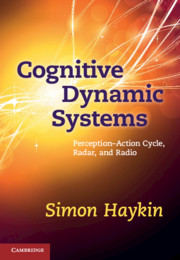Book contents
- Frontmatter
- Contents
- Preface
- Acknowledgments
- 1 Introduction
- 2 The perception–action cycle
- 3 Power-spectrum estimation for sensing the environment
- 4 Bayesian filtering for state estimation of the environment
- 5 Dynamic programming for action in the environment
- 6 Cognitive radar
- 7 Cognitive radio
- 8 Epilogue
- Glossary
- References
- Index
7 - Cognitive radio
Published online by Cambridge University Press: 05 June 2012
- Frontmatter
- Contents
- Preface
- Acknowledgments
- 1 Introduction
- 2 The perception–action cycle
- 3 Power-spectrum estimation for sensing the environment
- 4 Bayesian filtering for state estimation of the environment
- 5 Dynamic programming for action in the environment
- 6 Cognitive radar
- 7 Cognitive radio
- 8 Epilogue
- Glossary
- References
- Index
Summary
Interest in a new generation of engineering systems enabled with cognition, started with cognitive radio, a term that was coined by Mitola and McGuire (1999). In that article, the idea of cognitive radio was introduced within the software-defined radio (SDR) community. Subsequently, Mitola (2000) elaborated on a so-called “radio knowledge representation language” in his own doctoral dissertation. Furthermore, in a short section entitled “Research issues” at the end of his doctoral dissertation, Mitola went on to say the following:
‘How do cognitive radios learn best? merits attention’. The exploration of learning in cognitive radio includes the internal tuning of parameters and the external structuring of the environment to enhance machine learning. Since many aspects of wireless networks are artificial, they may be adjusted to enhance machine learning. This thesis did not attempt to answer these questions, but it frames them for future research.
Then, in Haykin (2005a), the first journal paper on cognitive radio, detailed expositions of signal processing, control, learning and adaptive processes, and game-theoretic ideas that lie at the heart of cognitive radio were presented for the first time. Three fundamental cognitive tasks, embodying the perception–action cycle of cognitive radio, were identified in that 2005 paper:
radio-scene analysis of the radio environment performed in the receiver;
transmit-power control and dynamic spectrum management, both performed in the transmitter; and
global feedback, enabling the transmitter to act and, therefore, control data transmission across the forward wireless (data) channel in light of information about the radio environment fed back to it by the receiver.
- Type
- Chapter
- Information
- Cognitive Dynamic SystemsPerception-action Cycle, Radar and Radio, pp. 230 - 281Publisher: Cambridge University PressPrint publication year: 2012
- 1
- Cited by



